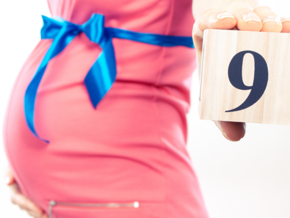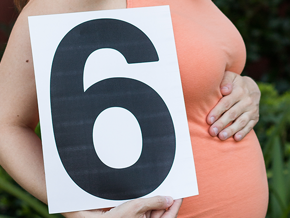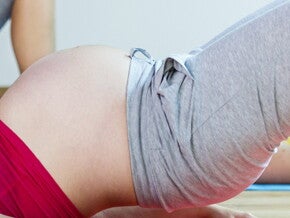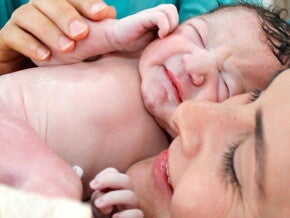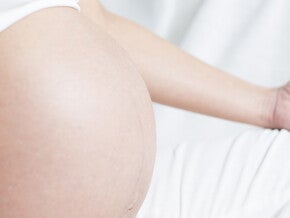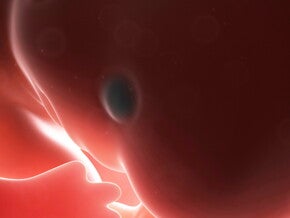
Nausea and vomiting
These are common complaints during the first trimester. Often the situation is aggravated by feelings of hunger. Always keep a dry biscuit at hand to alleviate that hungry feeling. Drinking water between meals, increasing your protein intake and taking Vitamin B6 may also help. Often the situation is aggravated by feelings of hunger. Always keep a dry biscuit at hand to alleviate that hungry feeling. Keeping away from cooking smells, and eating cold foods and drinks that have fewer smells, such as crackers, cereals, sandwiches, yoghurts, fruits and smoothies, may help your nausea.
Vitamin B6: Nestlé MATERNA® contains additional vitamins and minerals, which are needed for the growth and development of your baby, as well as for your wellbeing and health.
Other ways to avoid nausea and vomiting include:
- Eating dry foods, such as toast, crackers or plain biscuits, first thing in the morning.
- Sucking ice cubes may help freshen your mouth without overloading your stomach.
- Food or drinks containing ginger, such as ginger tea, ginger ale or ginger biscuits, can help reduce feelings of sickness. Lemon and peppermint teas may also help.
- Avoid greasy, fatty and dried foods, as they may worsen nausea, while tight clothing and lying down after meals may lead to discomfort.
Iron during pregnancy
Pregnant women can become low in iron, therefore it is important that your diet contains plenty of iron-rich foods, and foods containing vitamin C, such as a glass of fruit juice, with iron-rich meals to help the body absorb the iron. Good sources of iron are red meat and fortified breakfast cereals. The demands of your growing baby mean you may need to boost your supply, particularly in the second and third trimesters. The routine blood tests you have during pregnancy will identify if you are low on iron. If necessary, your GP may prescribe iron tablets, in which case you may want to increase the amount of fibre and probiotics in your diet to help counteract potential side effects like constipation.
To boost your iron intake try to include iron-rich foods at every meal, such as red meat, dark green vegetables like broccoli and watercress, fortified breakfast cereals, pulses, egg yolk, nuts and seeds, dried fruit, as well as wholemeal bread. Be sure to include foods rich in vitamin C, such as citrus or berry fruits or orange juice, with your iron-rich foods. It is best to avoid tea and coffee at mealtimes as they make it difficult for your body to absorb iron. Additionally, iron from fruit and vegetables is less easily absorbed than iron from meat and eggs.
Heartburn
Heartburn is common during the last trimester. It is caused by a combination of effects: increased hormonal activity and the relaxation of the sphincter muscle at the top of the stomach, which allows gastric juices into the oesophagus, producing a burning sensation. The pressure exerted by the growing uterus also aggravates the problem. Avoid fatty or gas-producing foods and large meals. Only take antacids on the advice of your caregiver.
Constipation
- The effects of pregnancy hormones, the slow movement of food along the intestines, and the pressure of the expanding uterus can all cause constipation. Plenty of liquids, increased fibre content in your diet and regular exercise should help to prevent constipation.
- Progesterone (pregnancy hormone) slows intestinal function – the longer the stool sits in the large intestine, the harder and drier it gets.
- While they have many benefits, prenatal vitamins, particularly those containing iron, are very constipating, as are calcium-based antacids and calcium supplements.
- As the uterus grows, it presses on the bowel and slows the passage of the stool.
- Avoid laxatives.
Haemorrhoids
Haemorrhoids are a very common medical problem when small veins around the rectum and anus become varicose – dilated and swollen. Haemorrhoids may become inflamed, develop small blood clots or even cause minor bleeding. There are many reasons pregnancy may cause haemorrhoids. For one, a pregnant woman’s enlarged womb increases pressure in the haemorrhoidal veins. Another reason is that certain hormones in pregnancy make your veins relax. Added to all of this is the fact that pregnancy often causes constipation.
Here are a few ways to help you prevent haemorrhoids:
- Eat a high fibre diet. A high fibre diet will move through the large intestine more easily and keep bowel movements from being too solid or too loose.
- Drink plenty of fluids – 1-2 litres per day.
- Exercise – regular exercise can help to prevent constipation and reduce the blood pressure in your blood vessels.
- Practice proper hygiene. Carefully cleanse the anal area to help prevent pain or irritation.
- Go to the toilet as soon as you feel the urge. If you wait to pass a bowel movement and the urge goes away, your stool could become dry and harder to pass.
- Use stool softeners when necessary. Stool softeners keep bowel movements moist and soft, helping them pass through the intestines more easily and be expelled without straining. Ask your doctor or pharmacist for advice.

